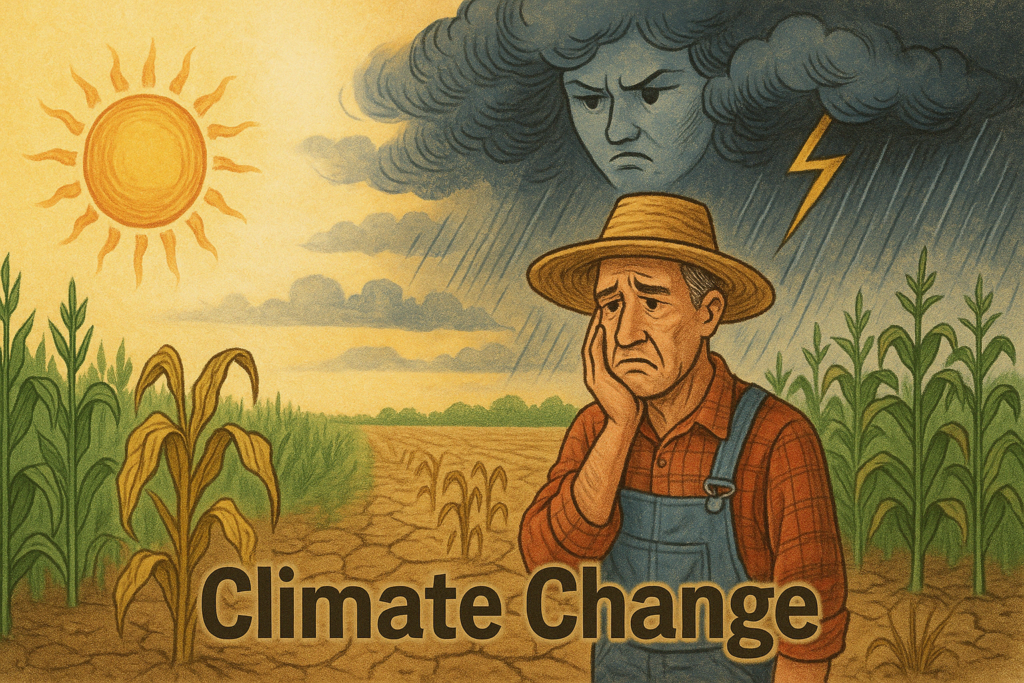Let’s talk about climate change and agriculture — not in the “blah blah carbon emissions” kind of way, but the “why are my tomatoes crying and my wheat acting weird” way. Because yeah, something’s up with the weather, and our farms are feeling it like a sunburn after a cloudy day.
Farmers used to worry about bugs, broken tractors, and whether their cousin would return their shovel. Now? It’s droughts, floods, and weather apps that lie. Welcome to farming in the age of climate chaos.
When Rain Ghosts You and the Sun Turns Extra
Let’s start with the obvious: drought effects are brutal. Crops are thirsty, and the sky just shrugs. Rain shows up late, forgets its job, or dumps everything in 12 minutes like it’s bailing on a first date.
In California, almond farmers are ripping out orchards because they can’t afford to water them anymore. In parts of Africa, maize crops are turning into crispy reminders that climate change is not just a buzzword — it’s a budget-buster.
And heatwaves? They’re not just uncomfortable. They fry crops. Livestock gets heat stress (yes, that’s a thing), and milk production drops because cows, like us, don’t work well in a sauna.
So yeah. If weather patterns were a group chat, they’d be full of erratic messages, all caps, and lots of ghosting.
Crop Roulette: Will It Grow or Nah?
Here’s the deal: food security depends on predictable seasons. Farmers need to know when to plant and what to plant. But lately, the seasons are acting like they’re on shuffle mode.
Some crops are shifting north like they’re escaping rent hikes. Grapes are thriving in the UK now (cheers to British wine?), while parts of Southeast Asia are losing rice yields faster than you can say “climate emergency.”
And pests? They’re thriving. Warmer winters mean more bugs survive to crash the crop party in spring. It’s like giving aphids an open bar tab.
This chaos means less food, higher prices, and a lot more stress. Basically, climate change is turning farming into a really bad reality show — with high stakes and no off switch.
Farming Innovations to the Rescue-ish
Okay, it’s not all doom and wilted lettuce. Farmers aren’t just sitting around waiting for the next monsoon tantrum. They’re fighting back with farming innovations that are as clever as a raccoon with Wi-Fi.
Smart irrigation systems are using sensors to water crops only when needed. Vertical farming is growing kale in skyscrapers (finally, city folks growing something besides avocado toast). And drought-resistant seeds are popping up like the superheroes of the plant world.
Also, some farmers are using apps to track soil health, weather patterns, and cow moods. (Okay, maybe not moods, but you can track milk yield and behavior, which is close.)
It’s a tech-meets-soil era. Because when the climate plays dirty, farmers upgrade their toolbox — and sometimes, their Wi-Fi.
The Weird, Messy Future of Climate and Crops
Here’s the messy part: we don’t fully know what the next decade holds. Climate models are like weather horoscopes — useful, but not gospel. Still, we do know this: hotter days, wonky rainfall, and rising CO₂ levels are all shaking up agriculture.
That means we’ll need to rethink what we grow, where we grow it, and how we deal when entire crops ghost us.
It also means supporting farmers — not just with sympathy tweets, but with policies, tech access, and real climate action. Because at the end of the day, if farms fail, dinner gets weird. (Hope you like cactus and lab-grown lentils.)
So, What’s the Vibe?
In short: climate change and agriculture are locked in a complicated, high-stakes relationship. It’s like Ross and Rachel, but with more heatwaves and fewer coffee breaks.
We can’t afford to ignore it. Not unless we’re cool with paying $17 for a wilted head of lettuce. But the good news? Farmers are resilient, innovation is real, and most of us do care — even if we’re still figuring out how to show it.
So the next time your salad tastes extra… dry, maybe send a little gratitude to the folks trying to grow food in a planet-wide identity crisis.
And tip your farmer, if you know one. They’re doing the hard work while the climate throws tantrums.


